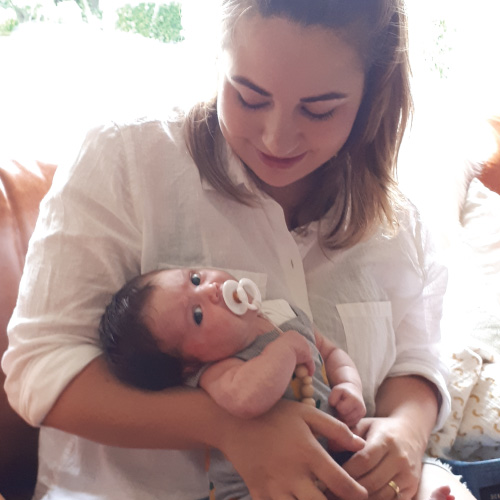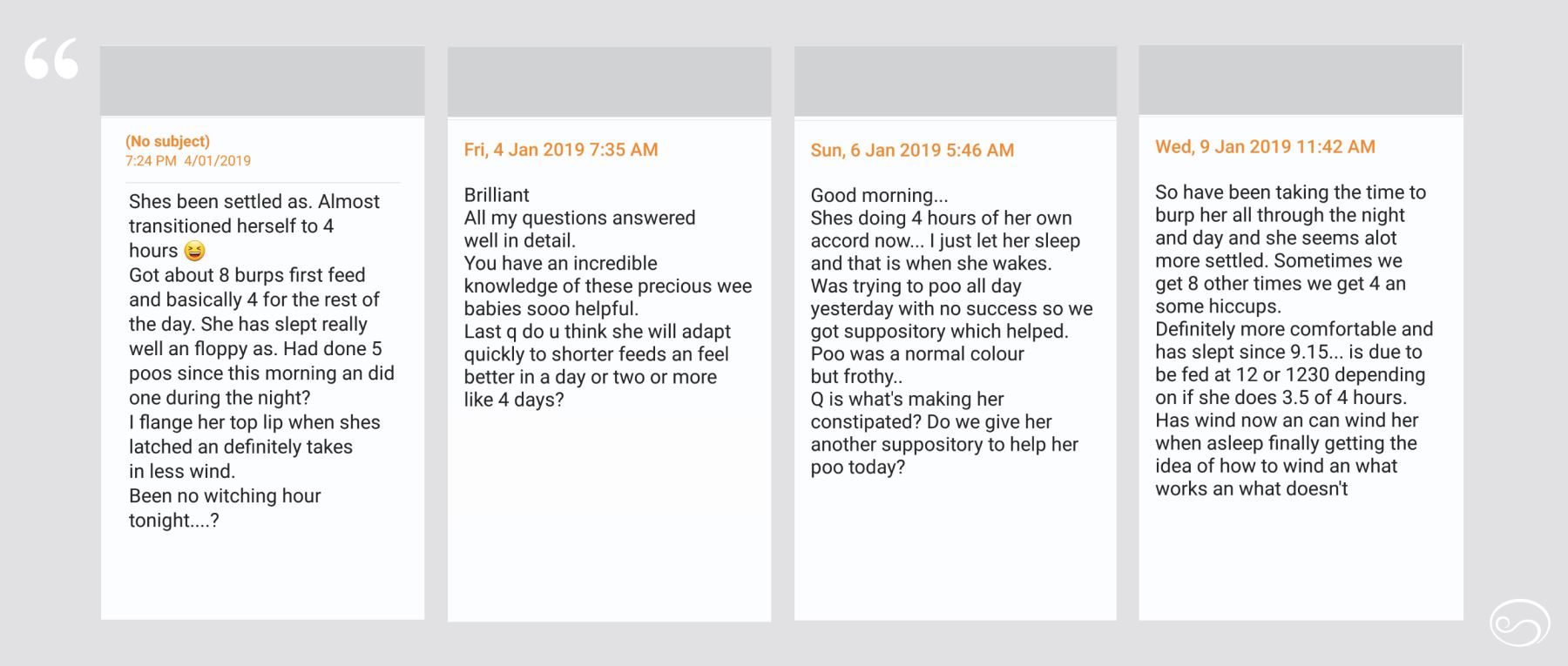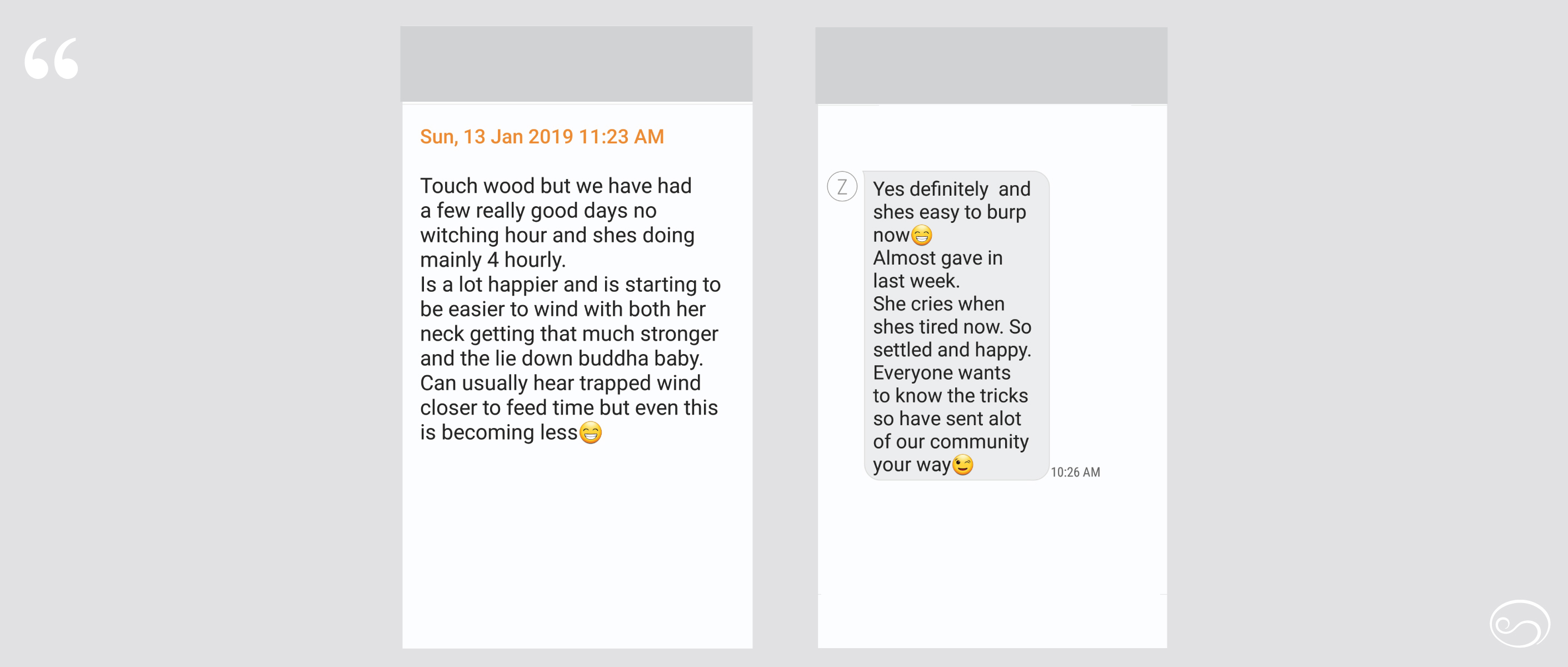'Colic' case study

It is common for newborns to generally feed and sleep well in the first week to two weeks of life as they adjust and rest up from the birth, even if they have are feeling Digestive Overload. Then, around three weeks of age, when they begin to wake up to the world and what they are feeling in their bodies a little more, they start to become vocal about any Digestive Overload that is occurring. Whether this is from:
- Receiving too much food
- Something in the breastfeeding diet
- formula choice
- not releasing enough trapped air after each feed
- tongue or lip tip that needs to be released
- or all of the list combined
On asking about Frankie's bowel motions, Zoe relayed that she had a dirty nappy after each feed. This is indicative of her food travelling through her system too quickly from the volume she was receiving. For a three week old we like to see around one good bowel motion a day with perhaps two smaller ones. Some baby's that have Digestive Overload go to the other extreme, experiencing constipated from the sheer volume they are receiving. This happens because of the tension from discomfort has then holding onto their stool longer. Of course we must also be aware that reduced bowel motions can mean hunger. If you are unsure which of these is happening for your baby, please feel free to book in for a consultation.
Advised changes
So, in order to stop Frankie falling into the awful cycle that is often promoted to parents as ‘normal’ – namely the witching hour – I advised Zoe to reduce Frankie’s time at the breast to 10-15 minutes to start with, and to continue as they were with only feeding one side for each feed.
At the time of their visit Frankie’s stomach was distended with an overload of wind. This is sadly a common scenario for our young – bloated stomachs. I advised Zoe that until Frankie felt better from being fed less, burps will continue to be a bit elusive and hard to release. Then, as Frankie felt more comfortable she would feel relaxed enough to release her burps easier. I also reassured her that it takes time to learn how to burp a baby for the first time, that practice builds confidence. Frankie was also still at an age where she was learning its okay to release burps. All of this tends to get easier around four to five weeks, and then again at three months. By six months an infant can cope with more trapped air travelling through the intestines. Thus burping becomes less of a priority but is still a necessity at times.
We also re-evaluated Zoe’s breastfeeding diet. She was still consuming a little dairy so I advised she stopped this because as humans we struggle to breakdown the proteins in dairy, casein and whey, for the first year of life. Taking it out of a breastfeeding diet can make a remarkable difference.
Over the next few days these are some of the messages I received from Zoe as they progressed through the changes and I continued to advise where necessary...

Results
Initially Zoe and Adrian felt comfortable feeding Frankie every three-and-a-half to four hourly, remaining flexible about this, while reducing the feeding time to 10-15 minutes. It took about five days for them to start to see some calmer behaviour, with the odd peak of unsettled times from not burping enough, as Frankie naturally moved herself to mostly four hourly feeding. It then took a further four or five days for Frankie to feel calm and happy as Mum and Dad burped Frankie more in the night, thus Frankie felt more comfortable in the digestive tract to release wind. On the 13th of January 2019, seven days after Zoe started reducing the feeding times, changed her diet and burping became a lot easier for everyone, Zoe wrote this to me...

The results for Frankie are what I achieve on a daily basis in my clinic. Digestive Overload, the cause of what is widely labelled as silent reflux, reflux, colic and Sandifer’s syndrome, can be healed naturally. There is no need for all the pain and anguish for newborns. No need for parents to be embroiled in a cycle of extreme worry, frustration and sometimes utter despair. No need. No need. No need. Please help more newborns and infants by sharing my work far and wide, helping more newborns and families in the process. Join us in our goal to eliminate these behaviours for our young – for it is possible!





